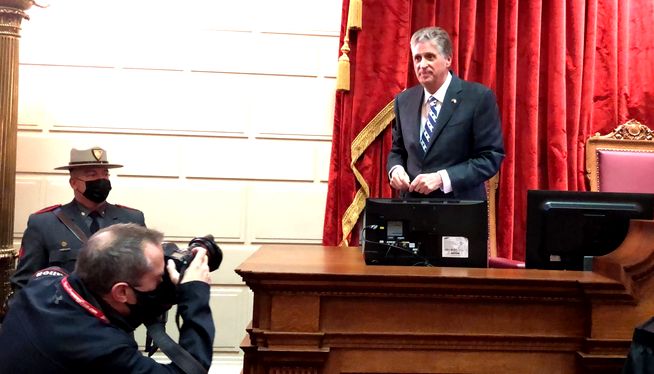
The Associated Press
Rhode Island’s governor submitted a $12.8 billion state budget plan to the General Assembly on Thursday that seeks to address the pandemic, build more affordable housing, invest in schools and help businesses.
Democratic Gov. Dan McKee said in the budget documents that he’s trying to revive the hospitality industry, bolster ocean-related research and businesses, invest in the workforce, and increase the per capita income for every family, with no broad tax increases. His decisions were informed by community conversations he held last year.
McKee’s proposal for fiscal year 2023 is an increase over last year’s proposal but a decrease of nearly $300 million, or 2.3%, from the enacted budget for the 2022 fiscal year. McKee said in the documents that the operating plan, plus the $1.1 billion the state received in federal pandemic relief funds and an additional $112 million in federal funding for capital projects, will address needs created by the pandemic and lay the foundation for a more resilient state.
The legislature will review the proposals and present its plan before the fiscal year begins in July.
McKee included with his budget proposal a plan to spend the bulk of the federal pandemic relief funds through fiscal 2027. His budget proposal includes about $431 million of those funds to be spent in fiscal 2023.
Among the larger proposed expenditures for the federal funding, McKee wants to allocate about $250 million for housing initiatives, including building new units of affordable housing, $211 million for economic and workforce development, including support for ocean-related businesses and rehabilitating the Port of Galilee, and $180 million to help small businesses and industries affected by the pandemic.
He wants to spend about $150 million to continue the public health response to the pandemic and $132 million to confront climate change by improving waterfront facilities and helping pay for high-efficiency electric heat pumps in homes.
With nearly $620 million in surplus funding from the fiscal 2022 budget, McKee wants to pay for one-time expenditures, including improving state buildings, building a new medical facility for the state psychiatric hospital, investing in the state’s information technology and infrastructure, and paying off pension liability for the state retirement system.
He wants ask voters to approve $350 million in spending through bond questions on the November ballot. The largest is a proposed $250 million bond for school construction projects.
He wants to fully fund state aid to schools, with nearly $50 million set aside so that no local education agency receives less state aid even if enrollment drops due to the pandemic or shifts to other schools.
For small businesses, McKee wants to reduce taxes, including lowering the corporate minimum tax, and allow restaurants to continue to sell alcohol with takeout orders, a practice that began during the pandemic.
McKee proposed establishing a $6 million annual fund to achieve the climate goals laid out in the state’s Act on Climate and fund renewable energy, energy efficiency and other eligible programs, with four positions created to support the state’s efforts to address climate change. He wants to spend $6.6 million to extend Medicaid coverage for new mothers and for all children, regardless of immigration status.
McKee recommended phasing out the tax on military service pensions over five years, which would cost the state $700,000 in fiscal 2023 and $5.8 million when fully implemented. He wants to continue to phase out the car tax by giving municipalities $166.6 million to offset lost revenues.
And McKee proposed legalizing and taxing recreational marijuana for adults, with sales to start in April 2023. That’s expected to generate roughly $8 million in revenue in fiscal 2023, which would mostly be spent on regulatory oversight.













